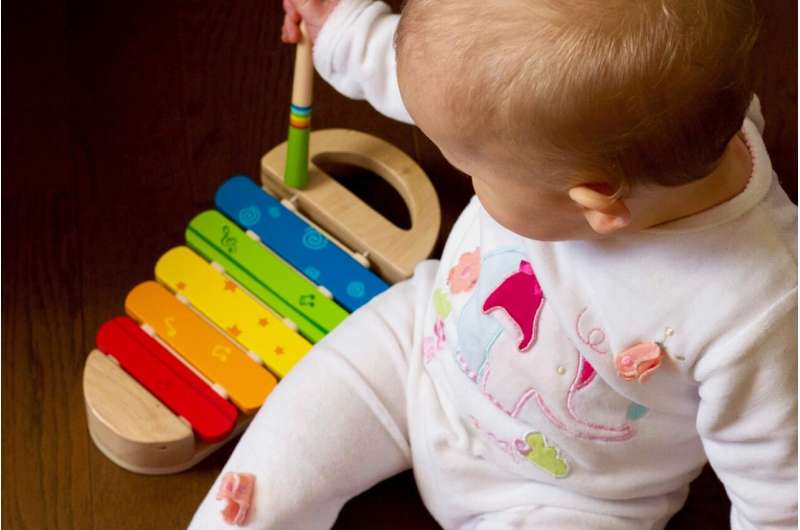
New research using experimental and brain imaging tools has shown that there is an association between caregiver and child cognition.
Researchers from the University of Nottingham’s School of Psychology examined infant visual cognition—important for how they navigate the world around them, engage with objects, and learn new concepts. The team explored whether caregiver cognitive functions would be associated with infant visual cognition.
The research has been published in the journals Infant Behavior and Development and Infant and Child Development.
About 90 families from East Midlands area who had infants between the ages of 6 and 10 months took part in the study in the Infant and Toddler Lab in the School of Psychology at the University of Nottingham. During their visit, both caregivers and their infants participated in experimental tasks while the researchers measured their behavioral responses and brain function using functional near-infrared spectroscopy (fNIRS).
In this technique, caregivers and infants wear caps with sensors that shine near-infrared light to measure brain function. Infants and caregivers were presented with colorful, changing shapes on a TV screen and researchers examined how they both looked at and switched their gaze between the shapes.
Caregivers also completed an inhibitory control task (how they respond to some stimuli and inhibit their response to others) and questionnaires that assessed how they regulated their behaviors.
The team found that infant visual cognition was linked to two aspects of caregiver cognition—their own visual cognition and behavioral regulation. Specifically, infants’ abilities to detect change was linked to their caregivers’ abilities to also detect change and efficiently monitor and/or inhibit their behaviors.
In addition to behavioral links, the team also found a link between caregiver and infant brain function—in regions in the parietal cortex, an area important for attending to objects in space, working memory and attention.
Dr. Sobana Wijeakumar, Assistant Professor in the School of Psychology, led this research. She said, “We are excited about these findings. We know from later in development that there are links between caregiver cognition and child cognition. It is promising to see these associations in the first year of life both in behavior and brain function.
“In the future, these findings could potentially be used to customize interventions based on caregiver behavioral preferences. We are also excited about the next stage of our work, which tackles whether these associations are linked to how caregivers and infants interact with one another during play time.”
One of the families commented, “Learning that there is a link between my own and my baby’s behavior and brain development is fascinating. We know that as they get older, they start to ‘copy’ our behaviors, but trying to examine how our brains could also be similarly wired—blows my mind.”
More information:
Aimee Theyer et al, Association between caregiver and infant visual neurocognition, Infant Behavior and Development (2024). DOI: 10.1016/j.infbeh.2024.101975
Ghada Amaireh et al, Caregiver executive functions are associated with infant visual working memory, Infant and Child Development (2024). DOI: 10.1002/icd.2543
Citation:
New study shows a link between caregiver and infant cognition (2024, September 26)
retrieved 26 September 2024
from https://medicalxpress.com/news/2024-09-link-caregiver-infant-cognition.html
This document is subject to copyright. Apart from any fair dealing for the purpose of private study or research, no
part may be reproduced without the written permission. The content is provided for information purposes only.


